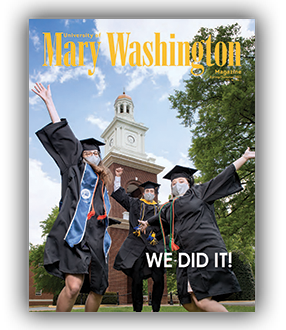
Kerwin A. Miller Sr. and Alethea “Lisa” Patillo Miller stand with daughter Alanna and son K.J. in the Maryland courtroom where Judge Miller presides. [Baltimore Sun Media. All Rights Reserved.]
“It made me want to do that – do something that actually made a difference and made an immediate impact on people,” Miller said of his decision to become a lawyer. “I thought about it so long that it was the only thing I could do.”
Miller overshot his childhood dream in January 2019 when, by appointment of Maryland Gov. Larry Hogan, he was sworn in as the second African American judge in the history of Harford County.
It was a long road to the bench, even though Miller made the journey much faster than most. When he chose Mary Washington College, his mother and his sister made the trek from his childhood home in the Bronx to Fredericksburg each October for parents’ weekend. They wouldn’t have missed graduation. And they were by his side when he was installed as judge.
Mary Washington had the classes Miller wanted, and a beautiful campus. It was close enough while still offering a completely different world from the boroughs of New York.
“I grew up in the city,” he said. “I was young, and I wanted to get away, but not too far away.”
He played basketball in his first year, until an injury sidelined him. He was excited by lectures from professors, especially one who was a practicing lawyer. And Miller found his “biggest takeaway” from college, wife Alethea “Lisa” Patillo Miller ’96.
“I am a little biased when I talk about Mary Wash,” said Miller, who delivered the keynote speech for UMW Black History Month in February. “I don’t know what it would have been if I hadn’t met her, but right now it’s ranked No. 1.”
As she finished her psychology degree, he started law school at Southwestern University in Los Angeles. He earned a juris doctorate in 1999, and the two decided to make a life together in Maryland. They wed in September 2002, and immediately upon passing the bar exam, Miller opened a private practice in Harford County, planning to continue the business law he’d done as an intern in L.A.
But his wife’s work as a forensic interviewer exposed him to the needs of vulnerable clients – children and senior citizens. He started picking up civil and criminal cases, and he realized he liked being in court more than poring over contracts.
In 2001, he joined the Legal Aid Bureau, representing children in abuse and neglect cases. He saw that the parents of those children needed better representation – and that the children of some underprivileged families were being removed from homes more from lack of services than from neglect or criminal action. He found his niche, he said, when he transferred to representing adults in criminal cases in the public defender’s office.
“It was something I absolutely fell in love with and became very efficient with,” Miller said.
Then state’s attorney Sandra O’Connor recruited Miller to her team in Baltimore County in 2006, and Miller eventually became deputy state’s attorney and chief homicide prosecutor in Cecil County, Maryland. In 2015, Miller became an administrative law judge, overseeing and ruling on appeals to the actions of state agencies. That’s where he was late in 2018 when he got the call from Hogan to serve as associate judge in Harford County.
Besides being a judge, Miller is president of the bar association there. He is active on boards and in community associations.
Since 2008, Miller also has been teaching law classes at the University of Maryland, Baltimore County. He has meant to make every semester his last, but he just can’t quit. He’s heard from too many appreciative students who have gone on to successful legal careers, and from many who say how consequential it was for them to learn from a practicing Black attorney and judge.
“I realized it’s important for them to see this, and they are telling me as much,” Miller said. “I felt it was an obligation as part of my service to the community to continue to be there.”
Miller’s two teenage children are proud of their dad and sometimes join him in the classroom. And he and his wife take the kids to Fredericksburg, to the place where their life together began.
“We love going back to campus,” Miller said. “We point out things to our kids, the dorms where we lived, the fountain. That’s how much that school experience meant to me.”
– Neva Trenis ’00
